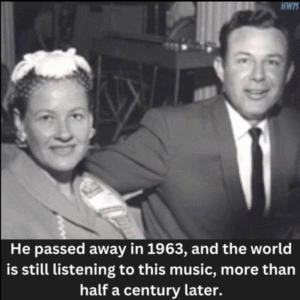“He’ll Have to Go”: A Crossover Classic of 1960
In 1960, country music met mainstream success in a remarkable way with Jim Reeves’ hauntingly smooth ballad, “He’ll Have to Go.” The song didn’t just dominate the country charts—it made a powerful impact on the pop charts as well, cementing its place as a crossover classic. Reeves’ velvet baritone, paired with a simple yet emotionally charged narrative, resonated with listeners across genres, making “He’ll Have to Go” one of the most iconic songs of its era.
Written by Joe Allison and Audrey Allison, “He’ll Have to Go” tells a story of a man asking his lover, through a phone call, to send another man away so they can talk honestly. The lyrics are minimal but deeply emotional, painting a picture of longing, jealousy, and quiet desperation. “Put your sweet lips a little closer to the phone,” Reeves sings, setting a tone that’s both intimate and melancholic. At a time when many country songs leaned heavily on twang and twostep rhythms, Reeves offered a polished, almost crooning vocal style that appealed to a broader audience.
The production of the song also played a critical role in its success. Chet Atkins, a key figure in the Nashville Sound movement, helped shape a style that blended traditional country with smoother pop arrangements. “He’ll Have to Go” featured soft backing vocals, subtle instrumentation, and a gentle rhythm section—all of which contributed to its crossover appeal. It didn’t alienate country fans, but it invited in a new group of listeners who might not have considered themselves country music enthusiasts before.
Released in late 1959, the song reached No. 1 on the Billboard Hot Country Songs chart in early 1960 and stayed there for an astounding 14 weeks. It also climbed to No. 2 on the Billboard Hot 100, showcasing its wide appeal. Internationally, it topped the UK Singles Chart, proving Reeves’ smooth vocal style and universal theme had global reach.
“He’ll Have to Go” became Jim Reeves’ signature song and helped define the countrypolitan sound, a smoother, more commercially viable version of traditional country music. This song also marked a turning point for the genre, showing that country artists could find success in the pop world without compromising their authenticity. Reeves would go on to record many hits, but this single remained his most enduring.
More than six decades later, “He’ll Have to Go” remains a masterclass in storytelling, vocal delivery, and crossover potential. Its success not only elevated Jim Reeves to superstardom but also paved the way for future country-pop crossover acts, from Glen Campbell to Dolly Parton to Taylor Swift. In the history of country music, few songs have had such a profound impact across genres as “He’ll Have to Go.”
